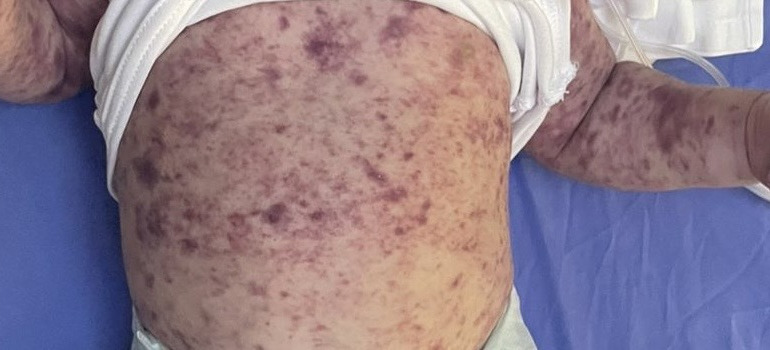Abdali Hospital - 25th floor - Amman - Jordan

Meningococcemia: A Serious Disease You Should Know About
●What is Meningococcemia?
-Meningococcemia is a rare but very dangerous disease that occurs when Neisseria meningitidis bacteria enter the bloodstream. These bacteria can cause severe infections, leading to blood poisoning (sepsis) and organ failure. If not treated quickly, it can result in death within hours.
●How Does a Person Get Infected?
-These bacteria can live in the throat and nose of some people without causing harm, but in some cases, they spread to others and cause a serious infection. The infection usually spreads through:
• Respiratory droplets: From coughing or sneezing.
• Direct contact: Such as kissing or sharing personal items (cups, utensils, etc.).
• Crowded places: Schools, workplaces, dormitories, and military camps, where bacteria spread more easily.
●What Are the Symptoms?
-Symptoms appear suddenly and progress rapidly. They include:
1. High fever and chills.
2. Excessive sweating.
3. A skin rash that may look like small bruises or purple spots.
4. Extreme fatigue and confusion.
5. Severe headache.
6. Muscle and joint pain.
7. Stiff neck (if meningitis is also present).
8. Low blood pressure, which can lead to loss of consciousness.
If these symptoms appear, seek medical attention immediately, as the disease can lead to septic shock or organ failure.
●How Is It Diagnosed?
-Doctors use several tests to diagnose meningococcemia, including:
• Blood tests to detect bacteria in the bloodstream.
• Spinal tap (lumbar puncture) if meningitis is suspected, where a sample of spinal fluid is analyzed.
• Skin tests or cultures from body fluids to confirm the presence of the bacteria.
●How Can You Prevent It?
-The best way to protect against meningococcemia is vaccination. There are effective vaccines, and they are recommended for:
• Children and teenagers, as part of routine immunization in some countries.
• People living in crowded places, such as college dormitories or military camps.
• Travelers to areas where the disease is common, especially in parts of Africa.
• People with weakened immune systems.
-Other ways to prevent infection include:
• Frequent handwashing with soap and water.
• Avoiding sharing personal items like toothbrushes or drinking cups.
• Covering your mouth when coughing or sneezing.
• Taking preventive antibiotics if you have been in close contact with an infected person.
●Is the Disease Really That Dangerous?
-Yes. Meningococcemia is a life-threatening disease that can cause death within hours if not treated. Even with treatment, it may lead to long-term complications, such as limb loss due to poor blood circulation or neurological problems.
Being aware of the disease and acting quickly if symptoms appear can save lives.